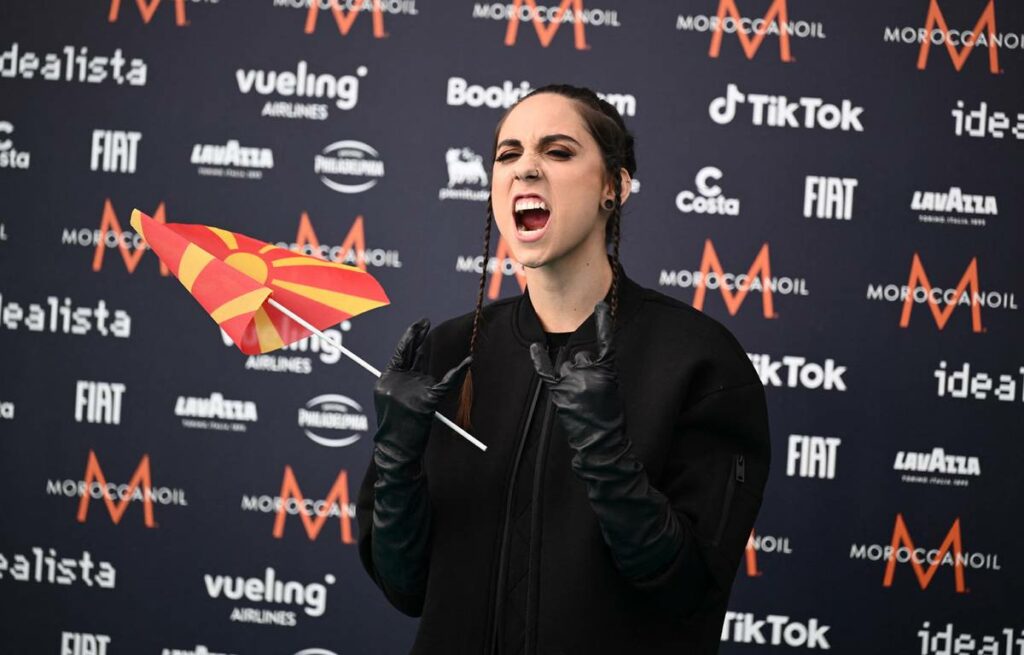From our special correspondent in Turin (Italy)
A seemingly innocuous gesture that took on an enormous dimension. This Sunday evening, the opening ceremony of Eurovision 2022 was held at the Royal Palace of Venaria, twenty minutes north of Turin. The forty participating delegations marched on the turquoise carpet (the emblematic color of one of the competition’s main sponsors), answered questions from the media who were waiting for them on site, and posed in front of the photographers.
Andrea Koevska, the representative of North Macedonia, did not deviate from this traditional photo session. After a few moments, the 22-year-old singer got rid of her flag to be more free of her movements. She threw it, smiling, dragging it to the ground, before taking up position in front of the goals.
“She disrespected a national symbol”
And this is what caused controversy. The Macedonian channel MPT, which broadcasts the competition and oversees the delegation, issued a press release in the process to « condemn the scandalous attitude » of its artist who, she wrote, « with this gesture, lacked respect to a national symbol, which is punishable by law. »
The public media demanded that Andrea Koevska “apologize to the people” and even raised the possibility of an outright withdrawal from competition. “All legal means will be taken against those responsible for this scandal within the delegation,” the statement concluded.
Less than two hours later, the MPT uploaded a video in which Andrea Koevska appears, flag in hand, explaining that she « had no intention of offending [sa] nation » and that she had simply complied with the request of the photographers to take pictures without the flag. This, it seems, closed the ban on this outburst of national pride.
Precedents
This is not the first time that an artist representing North Macedonia at Eurovision has found himself accused of undermining the nation. Last year, Vasil Garvanliev had to explain himself because, in the clip of his song Here I Stand, he appeared in front of a work by Janeta Vangeli composed of a monochrome white, another green and a third red. Some of his compatriots saw it as a reference to the Bulgarian flag. However, relations between Bulgaria and North Macedonia are placed under the sign of more or less latent tensions, the first vetoing the integration of the second into the European Union. The singer, who has dual Macedonian and Bulgarian nationality, had delivered a second version of his clip, without the controversial plan. In a video posted on Facebook, he said: “I make no apologies for being who I am. I never will. However, if I have hurt anyone in any way, from the bottom of my heart: I’m sorry. Excuse me. »
In 2019, at Eurovision, Tamara Todevska was the pride of North Macedonia by coming first in the votes of the national juries before finishing in an honorable seventh place. A few weeks later, she was invited to sing the national anthem at the American Embassy in Skopje but omitted a verse referring to revolutionary figures. A lively controversy had then swelled, forcing her to justify herself. “They thought I had been paid for [ne pas chanter cette partie], she explained at the end of 2019 to the site Wiwiblogs. I made a mistake in the lyrics and the hate started. They hated me so much. When it was the time when I should have been happy with what happened [à l’Eurovision] and proud of myself, I found myself between four walls wondering what was happening to me. »
The story of a name…
North Macedonia, independent since the implosion of Yugoslavia in 1991, first declared its independence as the « Republic of Macedonia ». However, Greece opposed it because Macedonia is the name of its largest region. It was therefore under the name of the former Yugoslav Republic of Macedonia that the young state joined the UN in 1993… then Eurovision five years later.
His track record in the song contest is hardly brilliant, consisting only of places in the bottom of the second half of the ranking. And again, when its artists were able to reach the final – which was not the case between 2013 and 2018. In 2019, after finding common ground with Greece, the country took its current name: North Macedonia . That year, Tamara Todevska therefore offered her her very first top 10. “It would be naïve to think that it was a coincidence if the first participation in Eurovision with the new name pacified saw Macedonia not only to return to the final after so many years, but also to obtain the best result in its history: 305 points. Including one from Greece, ”says Giacomo Natali in his book Capira Eurovision (unpublished in French).
Andrea Koevska is supposed to participate in the second semi-final of Eurovision, which will be broadcast live from Turin on Culturebox (channel 14), Thursday, from 9 p.m. His song is called Circles.


